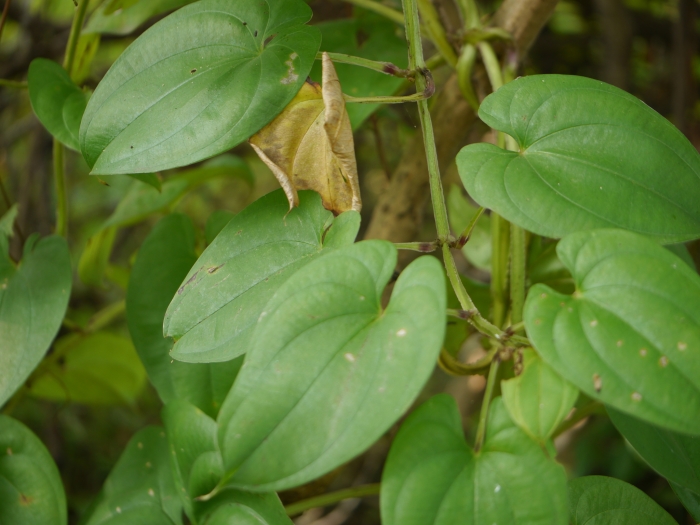Purple Yam
(Dioscorea alata)
Purple Yam (Dioscorea alata)
/
/

© Dinesh Valke
CC BY-SA 4.0
Image By:
© Dinesh Valke
Recorded By:
Copyright:
CC BY-SA 4.0
Copyright Notice:
Photo by: © Dinesh Valke | License Type: CC BY-SA 4.0 | License URL: http://creativecommons.org/licenses/by-sa/4.0/ | Uploader: dineshvalke | Publisher: iNaturalist |

























Estimated Native Range
Summary
Dioscorea alata, commonly known as purple yam or ube, is a perennial vine native to tropical and subtropical Asia, including the Philippines, where it thrives in rainforests and other moist, fertile environments. It is particularly adapted to grow in partial shade under the canopy of larger trees. This species is known for its large, tuberous roots that exhibit a vivid violet to bright lavender color, which are a staple in various culinary traditions. The plant can climb to heights of 6 to 15 feet (1.8 to 4.5 meters) with broad, heart-shaped leaves and small, inconspicuous male and female flowers on separate plants during the summer months.
In cultivation, Dioscorea alata is valued for its edible tubers that are rich in nutrients and antioxidants. It is used extensively in Filipino cuisine for desserts such as ube cake and halo-halo, and is also gaining popularity in other culinary cultures. The plant requires consistently moist, well-drained soil and can be grown in part shade to mimic its native forest floor habitat. While it is not drought-tolerant, it can withstand short periods of water scarcity. It is propagated mainly through tuber cuttings or small bulbils that form in the leaf axils. In some tropical regions where it has been introduced, such as the southeastern United States, Dioscorea alata has become naturalized and is considered potentially invasive. Gardeners should be cautious and ensure it does not escape cultivation and disrupt local ecosystems.CC BY-SA 4.0
In cultivation, Dioscorea alata is valued for its edible tubers that are rich in nutrients and antioxidants. It is used extensively in Filipino cuisine for desserts such as ube cake and halo-halo, and is also gaining popularity in other culinary cultures. The plant requires consistently moist, well-drained soil and can be grown in part shade to mimic its native forest floor habitat. While it is not drought-tolerant, it can withstand short periods of water scarcity. It is propagated mainly through tuber cuttings or small bulbils that form in the leaf axils. In some tropical regions where it has been introduced, such as the southeastern United States, Dioscorea alata has become naturalized and is considered potentially invasive. Gardeners should be cautious and ensure it does not escape cultivation and disrupt local ecosystems.CC BY-SA 4.0
Plant Description
- Plant Type: Herb, Vine
- Height: 15-30 feet
- Width: 3-6 feet
- Growth Rate: Moderate, Rapid
- Flower Color: White
- Flowering Season: Summer, Fall
- Leaf Retention: Deciduous
Growth Requirements
- Sun: Full Sun
- Water: Medium
- Drainage: Medium, Fast
Common Uses
Edible*Disclaimer: Easyscape's listed plant edibility is for informational use. Always verify the safety and proper identification of any plant before consumption., Potted Plant
Natural Habitat
Native to tropical and subtropical rainforests and moist, fertile environments in Asia, particularly the Philippines
Other Names
Common Names: Purple Yam, Water Yam, Greater Yam, Inhame, Name-De-Agua, Ten-Months Yam, Ube
Scientific Names: , Dioscorea alata, Dioscorea aculeata, Dioscorea alata subsp. globosa, Dioscorea alata subsp. purpurea, Dioscorea alata subsp. tarri, Dioscorea alata subsp. vera, Dioscorea alata var. globosa, Dioscorea alata var. purpurea, Dioscorea alata var. tarri
GBIF Accepted Name: